https://youtu.be/DMIAbxGR6Dc?t=50
Whale rainbows – part of the weird and wonderful world we live in
AUTHOR
Amanda Coetzee
37 mins ago
Whales are mammals that breathe air into their lungs. The blowholes on the top or back of their heads are their nostrils through which they breathe. Their blowholes are covered by muscular flaps that keep water from entering them when they are under water.
Contrary to common belief, whales don’t blow water through their blowholes. They blow out a combination of air (they breathe out carbon dioxide, just as humans do) and mucus. A whale’s out-breath is warm from the whale’s warm body. In the colder and lower-pressure air above, water vapor that’s present condenses out above the whale as droplets. It’s this spray of fine droplets, known as the blow, that creates the rainbow under certain conditions.
https://lowvelder.co.za/481501/whale-ra ... orld-live/
Whales
- Richprins
- Committee Member
- Posts: 75424
- Joined: Sat May 19, 2012 3:52 pm
- Location: NELSPRUIT
- Contact:
Re: Whales
Please check Needs Attention pre-booking: https://africawild-forum.com/viewtopic.php?f=322&t=596
- Lisbeth
- Site Admin
- Posts: 65961
- Joined: Sat May 19, 2012 12:31 pm
- Country: Switzerland
- Location: Lugano
- Contact:
Re: Whales
Stranded humpback whale dies in the Eastern Cape
2019-05-22 13:25
Sharlene Rood
https://youtu.be/m_Hv7fBlf2I
A 10.2m male humpback whale that stranded at Hickman's River in East London on Monday, has died.
East London museum principal scientist Kevin Cole said the animal presumably died of organ failure.
On Monday, Cole told News24 that his team had tried its best to get the whale back to sea, but it had taken a lot of strain.
He said there was a slight chance it might have been able to float out during high tide.
"But there was just not enough water and it remained stranded," he said.
"When I arrived at the beach at sunrise [Tuesday morning], the whale had sadly already passed on."
Cole said the whale had seemed to be in reasonable health and rather young.
"The whale had no trauma to the body, it didn't look emaciated, though other cetacean researchers have commented that it looked quite thin," he said.
Tidal surges
Whale migration season has just started and Cole suspects the whale may have made a navigational error.
"The area is very deep and cuts into quite shallow water. We've had a few strong tidal surges in recent days. The whale came into shallow water and possibly panicked and became disoriented," he said.
The whale was estimated to weigh approximately 16 tons.
In 2016, a fully grown 22m-long, 40-ton fin whale stranded and died in the same area.
Cole said he spent most of Tuesday taking measurements and blood, muscle, blubber and skin samples, which will be sent to the Bayworld marine mammal collection, curated by Dr Greg Hofmeyr.
"At some stage, pathology will be done on the samples and tests for DNA," Cole said.
He planned to continue conducting tests on Wednesday.
The carcass will remain in the area as it poses no health hazard and the smell shouldn't be a problem.
"Normally if the carcass is in an area close to a bathing beach, then an effort is made by the municipality to remove it. But this whale was stranded in an area that is isolated and not frequented by many people for various reasons," Cole said.
"Once I open up the whale, it will decompose rather quickly. Over the next two months these nutrients will be returned to the sea."
2019-05-22 13:25
Sharlene Rood
https://youtu.be/m_Hv7fBlf2I
A 10.2m male humpback whale that stranded at Hickman's River in East London on Monday, has died.
East London museum principal scientist Kevin Cole said the animal presumably died of organ failure.
On Monday, Cole told News24 that his team had tried its best to get the whale back to sea, but it had taken a lot of strain.
He said there was a slight chance it might have been able to float out during high tide.
"But there was just not enough water and it remained stranded," he said.
"When I arrived at the beach at sunrise [Tuesday morning], the whale had sadly already passed on."
Cole said the whale had seemed to be in reasonable health and rather young.
"The whale had no trauma to the body, it didn't look emaciated, though other cetacean researchers have commented that it looked quite thin," he said.
Tidal surges
Whale migration season has just started and Cole suspects the whale may have made a navigational error.
"The area is very deep and cuts into quite shallow water. We've had a few strong tidal surges in recent days. The whale came into shallow water and possibly panicked and became disoriented," he said.
The whale was estimated to weigh approximately 16 tons.
In 2016, a fully grown 22m-long, 40-ton fin whale stranded and died in the same area.
Cole said he spent most of Tuesday taking measurements and blood, muscle, blubber and skin samples, which will be sent to the Bayworld marine mammal collection, curated by Dr Greg Hofmeyr.
"At some stage, pathology will be done on the samples and tests for DNA," Cole said.
He planned to continue conducting tests on Wednesday.
The carcass will remain in the area as it poses no health hazard and the smell shouldn't be a problem.
"Normally if the carcass is in an area close to a bathing beach, then an effort is made by the municipality to remove it. But this whale was stranded in an area that is isolated and not frequented by many people for various reasons," Cole said.
"Once I open up the whale, it will decompose rather quickly. Over the next two months these nutrients will be returned to the sea."
"Education is the most powerful weapon which you can use to change the world." Nelson Mandela
The desire for equality must never exceed the demands of knowledge
The desire for equality must never exceed the demands of knowledge
- Richprins
- Committee Member
- Posts: 75424
- Joined: Sat May 19, 2012 3:52 pm
- Location: NELSPRUIT
- Contact:
Re: Whales
Please check Needs Attention pre-booking: https://africawild-forum.com/viewtopic.php?f=322&t=596
- Flutterby
- Posts: 44029
- Joined: Sat May 19, 2012 12:28 pm
- Country: South Africa
- Location: Gauteng, South Africa
- Contact:
Re: Whales
My mom's maiden name was Hickman and she was born in East London!
- Lisbeth
- Site Admin
- Posts: 65961
- Joined: Sat May 19, 2012 12:31 pm
- Country: Switzerland
- Location: Lugano
- Contact:
Re: Whales
Octopus fishing in False Bay is putting whales at risk and costing taxpayers
BY SCOTT RAMSAY - 13TH JUNE 2010 - IOL
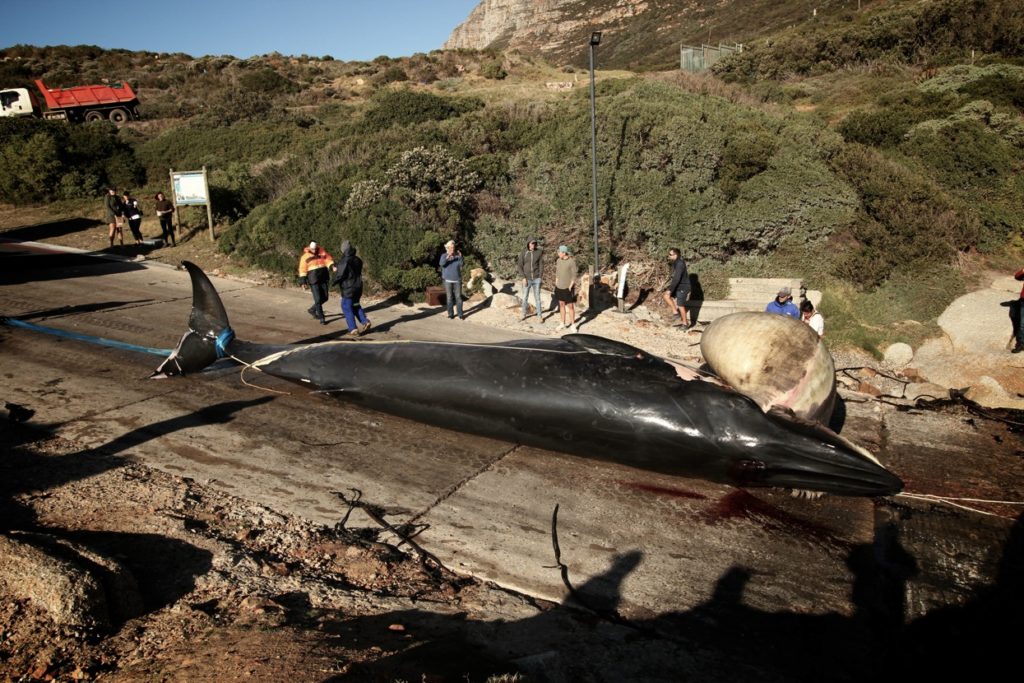
Another dead 12-metre Bryde’s whale was found in False Bay near Cape Town last week after becoming entangled in octopus trap ropes. The traps have been in use by a single company since 1998, supposedly under a supposedly “exploratory permit”
Members of the public spotted the entangled whale – a sub adult male roughly ten years old – about two kilometres offshore from Miller’s Point, a popular boat-launching site within Table Mountain National Park’s Marine Protected Area.
A team from City of Cape Town on an inflatable boat cut the dead whale free of the ropes and towed the six-ton carcass to the slipway for removal by truck to Visserhoek landfill site north of Melkbos, where it was buried.
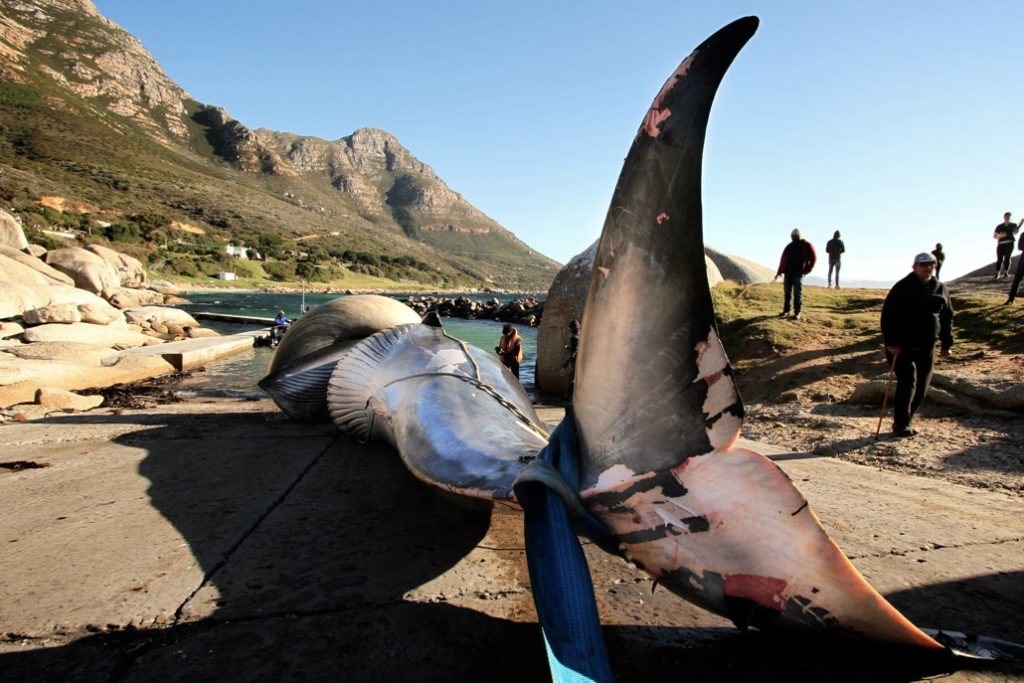
By Craig Foster/ Sea Change
Witnesses on the slipway spoke of how the whale’s body had been deeply lacerated, showing signs of painful and futile attempts to free itself from nylon ropes that are around five centimetres thick. The whale’s tongue had become distended and bloated.
The dead Bryde’s whale (pronounced “Brooders”) is the sixth whale in False Bay that has died from drowning in octopus fishing trap ropes in the past four years, said a City of Cape Town official who works in coastal management who requested to remain anonymous.
“At least eight whales have become entangled, and six have died,” the city official explained. “But potentially both those numbers are underestimated, as we don’t certainly know of all the cases.”
A few days earlier, on Saturday 8th June, volunteers freed a young humpback whale from octopus trap ropes, also near Miller’s Point.
“We found a Humpback whale calf entangled in rope around its body and fins and anchored to the sea bed,” said Craig Lambinon from SAWDN. “A larger whale was present which we suspect to be a family member of the calf.”
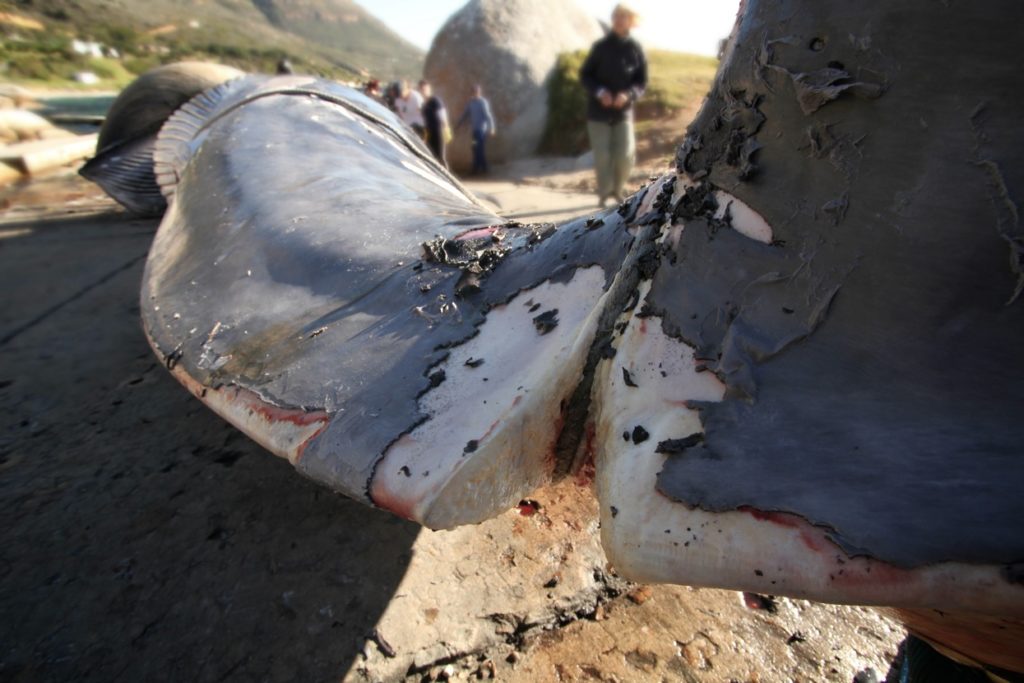
By Craig Foster/ Sea Change
The death of the Bryde’s whale and entanglement of the humpback comes at the start of the Cape’s whale season, when more and more whales are seen in Cape waters during winter and spring. Cities and towns like Cape Town, Hermanus and Plettenberg Bay offer both boat-based and land-based whale watching. Most commonly-sighted species include Southern Right, Humpback and Bryde’s whales.
Only one company has operated the octopus fishing traps since 1998 under a so-called “exploratory permit”, granted by Department of Agriculture, Forestry and Fisheries.
The city official explained that the purpose of the exploratory permit is to establish through scientific study whether the octopus fishing is sustainable.
“But to our knowledge, no scientific analysis has ever been conducted and the company continues to operate, catching thousands of octopus without a sustainability assessment. And whales continue to die. It’s a failed experiment, and the fishery needs to be shut down as soon as possible.”
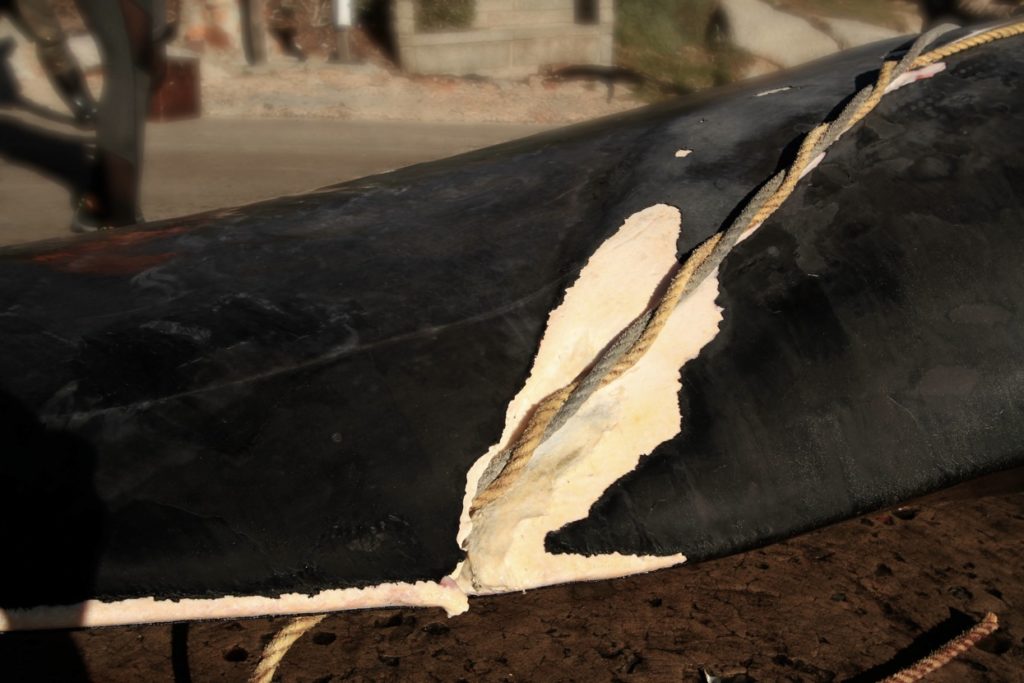
According to the permit conditions, the company is allowed to operate across multiple sites in False Bay, laying several hundred octopus traps at the bottom of the ocean on lines that can extend between five and 20 kilometres.
The so-called “pots” – or traps – lie on the ocean floor, and are connected via heavy chains and leaded ropes. These can entangle whales, holding the animals down below the surface, eventually drowning them.
Since 1998 the company has removed up to 50 tons of octopus per year in False Bay. The traps were originally considered “environmentally friendly”, because by-catch was considered acceptably low. But for several years the entanglement and deaths of whales have raised concerns about the ethical and economic validity of the industry.
Photographer and film maker Craig Foster was present on the Miller’s Point slipway when the dead whale was brought ashore. For ten years he has dived almost every day in False Bay, documenting marine life as part of the Sea Change Project, a non-profit organisation that has partnered with marine biology experts from the University of Cape Town.
“Why is this small company allowed to get away with this? It employs only a few people. False Bay is one of South Africa’s biodiversity hubs, and no-one knows what impact the octopus fishing industry is having on all other marine species.”
“It’s illegal for the public to approach a whale within 300 metres, and risk a fine of imprisonment or several hundred thousand rand,” said Foster. “Yet a fishing company is ultimately responsible for killing whales, and receives no fine or suspension? It makes no sense at all.”
The financial costs of disentangling and freeing trapped whales, and disposing of dead whales, are significant, yet the company is not liable.
“It costs money, time and labour effort to disentangle the whale, tow it ashore, truck it to a landfill site, and bury it,” explained the city official. “The company doesn’t pay this bill, the city and ratepayers do. Citizens are effectively subsidising the killing of whales while the company is allowed to fish for thousands of octopus in False Bay at great environmental, economic and ethical costs.”
“It’s not as if this company is employing hundreds of local people, or supplying food to local markets. All the octopus gets put on ice and exported to Asian countries. A small fishing company is benefiting while Cape Town’s international image as a tourism destination gets seriously tarnished by the killing of whales.”
Watch the video here:
Original article: https://www.iol.co.za/news/south-africa ... s-26149647
BY SCOTT RAMSAY - 13TH JUNE 2010 - IOL

Another dead 12-metre Bryde’s whale was found in False Bay near Cape Town last week after becoming entangled in octopus trap ropes. The traps have been in use by a single company since 1998, supposedly under a supposedly “exploratory permit”
Members of the public spotted the entangled whale – a sub adult male roughly ten years old – about two kilometres offshore from Miller’s Point, a popular boat-launching site within Table Mountain National Park’s Marine Protected Area.
A team from City of Cape Town on an inflatable boat cut the dead whale free of the ropes and towed the six-ton carcass to the slipway for removal by truck to Visserhoek landfill site north of Melkbos, where it was buried.

By Craig Foster/ Sea Change
Witnesses on the slipway spoke of how the whale’s body had been deeply lacerated, showing signs of painful and futile attempts to free itself from nylon ropes that are around five centimetres thick. The whale’s tongue had become distended and bloated.
The dead Bryde’s whale (pronounced “Brooders”) is the sixth whale in False Bay that has died from drowning in octopus fishing trap ropes in the past four years, said a City of Cape Town official who works in coastal management who requested to remain anonymous.
“At least eight whales have become entangled, and six have died,” the city official explained. “But potentially both those numbers are underestimated, as we don’t certainly know of all the cases.”
A few days earlier, on Saturday 8th June, volunteers freed a young humpback whale from octopus trap ropes, also near Miller’s Point.
“We found a Humpback whale calf entangled in rope around its body and fins and anchored to the sea bed,” said Craig Lambinon from SAWDN. “A larger whale was present which we suspect to be a family member of the calf.”

By Craig Foster/ Sea Change
The death of the Bryde’s whale and entanglement of the humpback comes at the start of the Cape’s whale season, when more and more whales are seen in Cape waters during winter and spring. Cities and towns like Cape Town, Hermanus and Plettenberg Bay offer both boat-based and land-based whale watching. Most commonly-sighted species include Southern Right, Humpback and Bryde’s whales.
Only one company has operated the octopus fishing traps since 1998 under a so-called “exploratory permit”, granted by Department of Agriculture, Forestry and Fisheries.
The city official explained that the purpose of the exploratory permit is to establish through scientific study whether the octopus fishing is sustainable.
“But to our knowledge, no scientific analysis has ever been conducted and the company continues to operate, catching thousands of octopus without a sustainability assessment. And whales continue to die. It’s a failed experiment, and the fishery needs to be shut down as soon as possible.”

According to the permit conditions, the company is allowed to operate across multiple sites in False Bay, laying several hundred octopus traps at the bottom of the ocean on lines that can extend between five and 20 kilometres.
The so-called “pots” – or traps – lie on the ocean floor, and are connected via heavy chains and leaded ropes. These can entangle whales, holding the animals down below the surface, eventually drowning them.
Since 1998 the company has removed up to 50 tons of octopus per year in False Bay. The traps were originally considered “environmentally friendly”, because by-catch was considered acceptably low. But for several years the entanglement and deaths of whales have raised concerns about the ethical and economic validity of the industry.
Photographer and film maker Craig Foster was present on the Miller’s Point slipway when the dead whale was brought ashore. For ten years he has dived almost every day in False Bay, documenting marine life as part of the Sea Change Project, a non-profit organisation that has partnered with marine biology experts from the University of Cape Town.
“Why is this small company allowed to get away with this? It employs only a few people. False Bay is one of South Africa’s biodiversity hubs, and no-one knows what impact the octopus fishing industry is having on all other marine species.”
“It’s illegal for the public to approach a whale within 300 metres, and risk a fine of imprisonment or several hundred thousand rand,” said Foster. “Yet a fishing company is ultimately responsible for killing whales, and receives no fine or suspension? It makes no sense at all.”
The financial costs of disentangling and freeing trapped whales, and disposing of dead whales, are significant, yet the company is not liable.
“It costs money, time and labour effort to disentangle the whale, tow it ashore, truck it to a landfill site, and bury it,” explained the city official. “The company doesn’t pay this bill, the city and ratepayers do. Citizens are effectively subsidising the killing of whales while the company is allowed to fish for thousands of octopus in False Bay at great environmental, economic and ethical costs.”
“It’s not as if this company is employing hundreds of local people, or supplying food to local markets. All the octopus gets put on ice and exported to Asian countries. A small fishing company is benefiting while Cape Town’s international image as a tourism destination gets seriously tarnished by the killing of whales.”
Watch the video here:
Original article: https://www.iol.co.za/news/south-africa ... s-26149647
"Education is the most powerful weapon which you can use to change the world." Nelson Mandela
The desire for equality must never exceed the demands of knowledge
The desire for equality must never exceed the demands of knowledge
- Lisbeth
- Site Admin
- Posts: 65961
- Joined: Sat May 19, 2012 12:31 pm
- Country: Switzerland
- Location: Lugano
- Contact:
Re: Whales
Mommy humpback whale 'thanks' rescuers after fishing line tangle
https://youtu.be/Ai6dsKwI9nE
The SA Whale Disentanglement Network (SAWDN), in conjunction with the National Sea Rescue Institute (NSRI) on Monday rescued a female Humpback whale swimming with her calf.
The whales were caught in fishing rope and two flotation buoys off St Francis Bay, about 100km from Port Elizabeth.
"NSRI Port Elizabeth sea rescue craft accompanied by SAWDN volunteers and a SAWDN volunteer whale watching boat responded. Arriving on the scene, we found the whale moving swiftly at about 5 knots and entangled in two wraps of fishing rope around her body and trailing fishing rope attached to two flotation buoys," the NSRI said in a statement.
Volunteers moved to free the whale by first slowing the whale down and then cutting the whale free from the rope.
"Using a rescue knife, our SAWDN volunteers cut one rope free of the whale and then pulled on a remaining rope entangled around the body of the whale - that rope came free and all rope and the flotation buoys were recovered," said the NSRI.
Number of deaths
The whole operation took around two and a half hours and the whale breached once freed.
According to the International Whaling Commission, it is estimated that more than 300 000 whales and dolphins die each year as a result of entanglement.
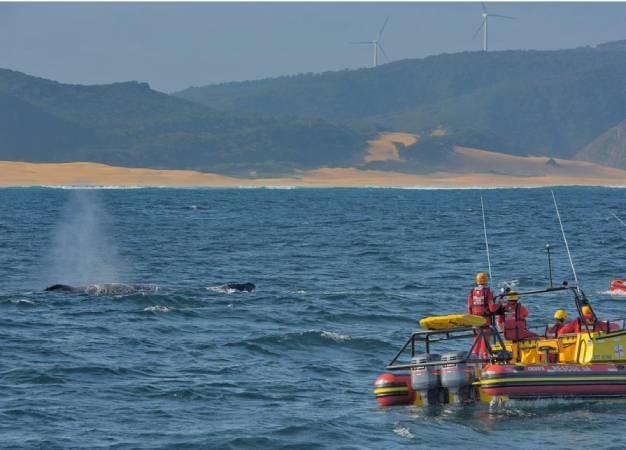
A female whale was rescued (Supplied: Raggie Charte
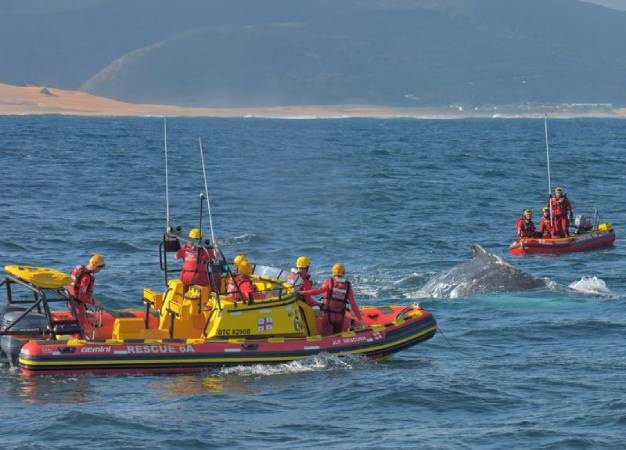
(Supplied: Raggie Charters)
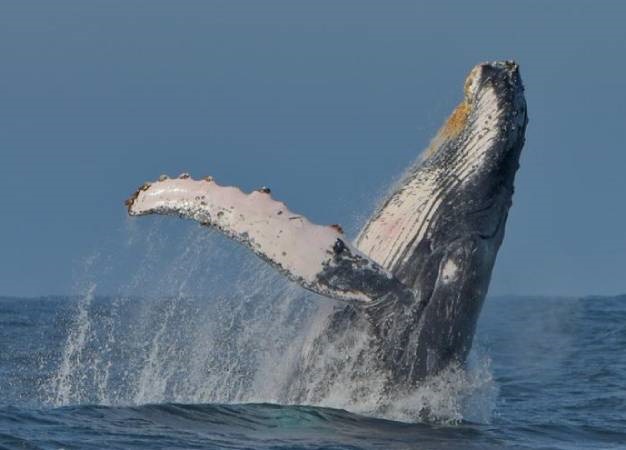
(Supplied: Raggie Charters)
Recently, Jacques du Toit of the environmental management department of the City of Cape Town told News24 that several whale carcasses are removed from the beaches around the city on an annual basis.
"We recover approximately 14 or 15 or carcasses per year and that includes carcasses that wash out or whales which die from entanglements."
The volunteer SAWDN has rescued 184 whales since its establishment in 2006.
All whale in distress sightings should be reported to local authorities or rescue organisations, such as the NSRI.
According to regulations on whale watching from the Marine Living Resources Act (18 of 1998), it is illegal to approach within 300m of a whale or dolphin.
https://youtu.be/Ai6dsKwI9nE
The SA Whale Disentanglement Network (SAWDN), in conjunction with the National Sea Rescue Institute (NSRI) on Monday rescued a female Humpback whale swimming with her calf.
The whales were caught in fishing rope and two flotation buoys off St Francis Bay, about 100km from Port Elizabeth.
"NSRI Port Elizabeth sea rescue craft accompanied by SAWDN volunteers and a SAWDN volunteer whale watching boat responded. Arriving on the scene, we found the whale moving swiftly at about 5 knots and entangled in two wraps of fishing rope around her body and trailing fishing rope attached to two flotation buoys," the NSRI said in a statement.
Volunteers moved to free the whale by first slowing the whale down and then cutting the whale free from the rope.
"Using a rescue knife, our SAWDN volunteers cut one rope free of the whale and then pulled on a remaining rope entangled around the body of the whale - that rope came free and all rope and the flotation buoys were recovered," said the NSRI.
Number of deaths
The whole operation took around two and a half hours and the whale breached once freed.
According to the International Whaling Commission, it is estimated that more than 300 000 whales and dolphins die each year as a result of entanglement.

A female whale was rescued (Supplied: Raggie Charte

(Supplied: Raggie Charters)

(Supplied: Raggie Charters)
Recently, Jacques du Toit of the environmental management department of the City of Cape Town told News24 that several whale carcasses are removed from the beaches around the city on an annual basis.
"We recover approximately 14 or 15 or carcasses per year and that includes carcasses that wash out or whales which die from entanglements."
The volunteer SAWDN has rescued 184 whales since its establishment in 2006.
All whale in distress sightings should be reported to local authorities or rescue organisations, such as the NSRI.
According to regulations on whale watching from the Marine Living Resources Act (18 of 1998), it is illegal to approach within 300m of a whale or dolphin.
"Education is the most powerful weapon which you can use to change the world." Nelson Mandela
The desire for equality must never exceed the demands of knowledge
The desire for equality must never exceed the demands of knowledge
- Richprins
- Committee Member
- Posts: 75424
- Joined: Sat May 19, 2012 3:52 pm
- Location: NELSPRUIT
- Contact:
Re: Whales
Please check Needs Attention pre-booking: https://africawild-forum.com/viewtopic.php?f=322&t=596
- Lisbeth
- Site Admin
- Posts: 65961
- Joined: Sat May 19, 2012 12:31 pm
- Country: Switzerland
- Location: Lugano
- Contact:
Re: Whales
Young humpback whale is dragged ashore to be buried after it suffocated in controversial octopus fishing lines off the coast of South Africa
- Scores of whales have become caught in the traps off the coast of South Africa
- Three whales have been entangled in the last two weeks and two have died
- People could be seen taking pictures of dead creature as it was brought ashore
By GEORGE MARTIN FOR MAILONLINE
PUBLISHED: 15:22 BST, 27 June 2019 | UPDATED: 15:31 BST, 27 June 2019
A young humpback whale has died after being caught in octopus fishing lines off the coast of South Africa.
Shocking pictures showed the animal being towed towards the shore by a fishing boat and lying covered in blood on the ground near the town of Fish Hoek outside Cape Town.
Passers-by could be seen taking pictures of the dead creature on Thursday as it was dragged away to be buried.
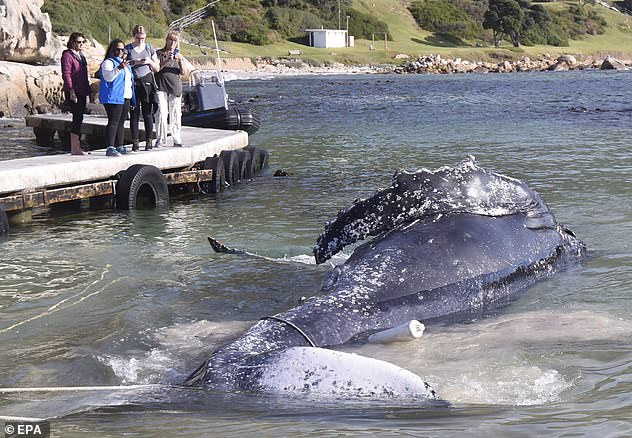
A group of people take pictures of the dead whale as it is brought ashore to be buried in Fish Hoek, South Africa
The rare animal is one of many to have been caught in the traps which have snared a large number of whales since they were installed under an 'exploratory permit' in 1998.
Three whales have been entangled in the last two weeks, of which two have died.
Only one company operated the permit in False Bay where the whale was killed this week under the premise of conducting scientific research into the sustainability of octopus fishing.
But campaigners argue that 'no scientific analysis has ever been conducted'
Earlier this month a dead Bryde's whale became the sixth of its kind to die from drowning in the octopus traps in the past four years - a city of Cape Town official said.
'At least eight whales have become entangled, and six have died,' the city official explained.
'But potentially both those numbers are underestimated, as we don't certainly know of all the cases.'
A few days earlier, on Saturday 8th June, volunteers freed a young humpback whale from octopus trap ropes nearby.
'We found a Humpback whale calf entangled in rope around its body and fins and anchored to the sea bed,' said environmental agency worker Craig Lambinon.
'A larger whale was present which we suspect to be a family member of the calf.'
- Scores of whales have become caught in the traps off the coast of South Africa
- Three whales have been entangled in the last two weeks and two have died
- People could be seen taking pictures of dead creature as it was brought ashore
By GEORGE MARTIN FOR MAILONLINE
PUBLISHED: 15:22 BST, 27 June 2019 | UPDATED: 15:31 BST, 27 June 2019
A young humpback whale has died after being caught in octopus fishing lines off the coast of South Africa.
Shocking pictures showed the animal being towed towards the shore by a fishing boat and lying covered in blood on the ground near the town of Fish Hoek outside Cape Town.
Passers-by could be seen taking pictures of the dead creature on Thursday as it was dragged away to be buried.

A group of people take pictures of the dead whale as it is brought ashore to be buried in Fish Hoek, South Africa
The rare animal is one of many to have been caught in the traps which have snared a large number of whales since they were installed under an 'exploratory permit' in 1998.
Three whales have been entangled in the last two weeks, of which two have died.
Only one company operated the permit in False Bay where the whale was killed this week under the premise of conducting scientific research into the sustainability of octopus fishing.
But campaigners argue that 'no scientific analysis has ever been conducted'
Earlier this month a dead Bryde's whale became the sixth of its kind to die from drowning in the octopus traps in the past four years - a city of Cape Town official said.
'At least eight whales have become entangled, and six have died,' the city official explained.
'But potentially both those numbers are underestimated, as we don't certainly know of all the cases.'
A few days earlier, on Saturday 8th June, volunteers freed a young humpback whale from octopus trap ropes nearby.
'We found a Humpback whale calf entangled in rope around its body and fins and anchored to the sea bed,' said environmental agency worker Craig Lambinon.
'A larger whale was present which we suspect to be a family member of the calf.'
"Education is the most powerful weapon which you can use to change the world." Nelson Mandela
The desire for equality must never exceed the demands of knowledge
The desire for equality must never exceed the demands of knowledge


